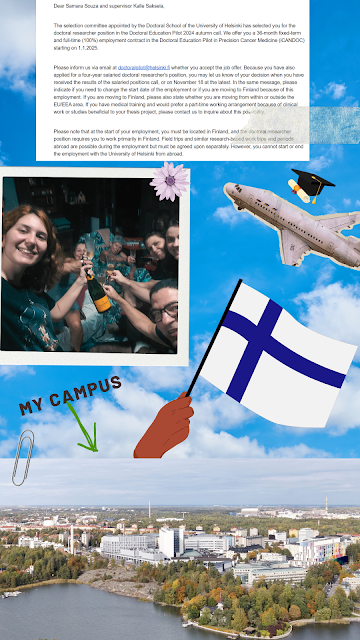Study abroad: Questions are more common in International Ph.D. interviews
I am fulfilling my promise to talk about the questions more common during my interviews at prestigious universities, such as Edinburgh and Liverpool. You can adapt the questions to the level that you want such as a master's degree.
Let's...
Questions:
1. Why do you want to do a Ph.D.?
You can talk about your career and link what you learned with this, what you need and what you want to improve and talk about what the Ph.D means for you.
2. Motivation to study a PhD at this Project/supervisor/program/university?
- Project: Discuss your necessity to expand your knowledge and articulate what you want and enjoy doing. Share your interests in the topic you are applying for, and relate them to your past experiences and future aspirations. Consider highlighting aspects of the project that you find important and impressive, emphasizing the opportunities it offers.
- Supervisor: Supervisor: What inspired you? (Their way of thinking, articles, lectures, ethics, concerns regarding diversity, inclusion, the world, nature, etc.) Ensure that these aspects align with your values.
- Program/university: Emphasize the alignment with your background, the emphasis on research, and flexibility (if that is a feature of the program). Discuss the university's excellence, interdisciplinary approach, partnerships, global impact, and your interest in learning a new language. Explain the reasons that led you to choose this university, including its rich history, reputation as a welcoming place, and the presence of notable individuals."
3. Tell me about yourself.
Discuss your background, including your place of origin, educational journey, experiences during your undergraduate and master's degrees, and the lessons you've learned. Share your objectives and, if applicable, mention any hobbies or interests.
4. What are your strengths and weaknesses?
Describe your strengths and weaknesses, providing examples to illustrate each. Additionally, discuss the steps you are taking to improve upon your weaknesses.
5. What did you understand about the PROJECT you are applying?
Discuss the articles you have read related to the subject and their relevance to the project. Share what aspects of the project excite you and what you are eager to contribute.
6. What do you think makes a good Ph.D. student, and what would you look for in a good supervisor?
Share your opinion on the qualities of an excellent student based on your experiences. Discuss the attributes you believe a good student should possess, such as discipline, resilience, dedication, curiosity, and the ability to work well in a group. Regarding supervisors, elaborate on the qualities you value, such as mentorship, communication skills, expertise in the field, and support for personal and professional growth.
7. Tell us about a paper you read recently (not linked to the Ph.D.) that interested you. Why was it so interesting?
I think this is self-explanatory.
8. An example of an experiment that did not go as expected and how you went about troubleshooting it? What did you learn from this experience?
Reflect on a specific experiment that encountered unexpected outcomes. Describe the problem you faced, the steps you took to troubleshoot it, and the eventual resolution. Conclude by sharing the key lessons you learned from this experience.
9. Most interesting in your career to date and how does that relate to your interest in this project, what have you found least interesting and why?
Discuss the most engaging career experiences and their connection to the project, along with less interesting aspects handled professionally.
10. Talk about your future career aspirations.
Outline realistic ambitions for future career growth and emphasize contributions to the field or society.
11. Why are you a good fit for this project?
Highlight alignment of skills and experiences with project requirements, demonstrating enthusiasm and understanding of project scope.
12. What will having a Ph.D. mean for your career/why do you need a PhD to do what you want to do?
Explain how obtaining a Ph.D. facilitates achievement of long-term career goals, emphasizing advanced expertise and opportunities it offers.
13. Questions for the panel
Doing questions for people who are evaluating you is important. In my opinion, it shows your interest and preoccupation with where you will do your Ph.D.
These questions could include things about the longer-term prospects e.g. how many students go on to academic careers after PhDs, do students get publications throughout their PhD
Bye-bey, stay strong ;)


.gif)




Comments
Post a Comment